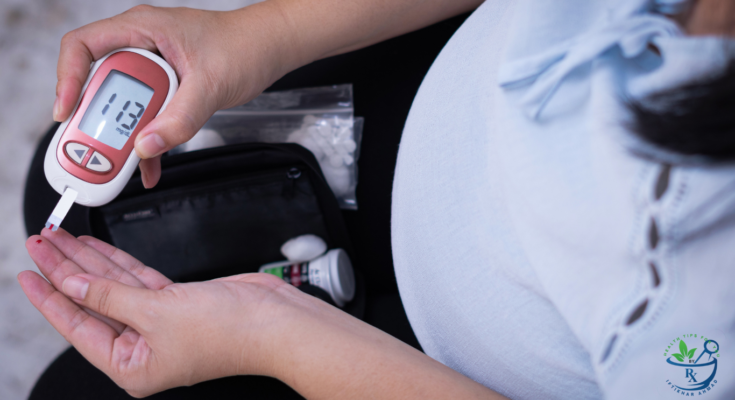We, the team of healthcare professionals aiming at women’s wellness during their pregnancy and their babies’ health, should make this type of diabetes diagnosis that makes so many pregnant women around the globe known. Gestational diabetes which is the occurrence of diabetes during pregnancy calls for great care to be ensured for the well-being of the mother as well as the offspring of the pregnancy. In this article, we will thoroughly explain why it is that gestational diabetes happens, what can increase the risk for it, and what are the most proper ways to keep it under control, while keeping a healthy lifestyle top of your priorities list.
What is Gestational Diabetes?
Gestational diabetes mellitus (GDM) emerges at the moment when a woman who entirely keeps diabetes away at the first time in her life develops high blood sugar (glucose) levels during pregnancy. It is usually first observed when the pregnancy reaches 24-28th weeks upon which the body’s demand for insulin outstrips production. This deficiency increases blood sugar levels that require treatments as the asymptomatic effects might hurt the health of both the mother and the developing foetus.
Symptoms of Gestational Diabetes
Thanks to its incubator role, gestational diabetes can develop quite unremarkably, thus routine testing during pregnancy for an early suspicion is the only way to prove it. However, some women may experience symptoms such as:
Increased Thirst
Over-drinking fluids can still cause thirst, and this can be due to the increased blood glucose levels in your blood.
Frequent Urination
The desire to wake to urinate, especially in the middle of the night, becomes atypical during gestational diabetes.
Fatigue
It can happen once you feel dull and hopeless of energy despite being well-rested or having enough sleep, which also can be a sign of fluctuating sugar levels in your blood.
Blurred Vision
High blood sugar can damage optic nerves and impair vision. This may manifest as momentary blurring of the vision or difficulty keeping a fixed focus.
Increased Hunger
Developing the feeling of hunger or craving markedly for food containing sweets or sugar might be an alarm that you have insulin resistance.
However, these symptoms may not confirm gestational diabetes so it is necessary to contact health care providers to ask for proper evaluation and diagnosis.
Embracing a Healthy Lifestyle for Gestational Diabetes Management

Just like with your diet, regular exercise ensures your weight is within normal limits. Stress management will ensure that you pass your pregnancy period and you are free of gestational diabetes. Moreover, performing some low-impact exercises while you are pregnant is a great way of augmenting insulin sensitivity, and at the same time, boosting your overall health. Besides, deep-breathing stances, meditation and mindfulness can be applied to help both the mother’s anxiety level and the offspring’s health.
Pregnant women get to receive the necessary data and support as healthcare professionals lay down the rules to help them effectively manage gestational diabetes conditions. To that end we can provide the best mother and baby care by adopting a holistic approach to caring that includes eating healthy foods, doing physical activity daily and general stress reduction techniques.
Pregnancy, with its complexities, can be relatively taxing with gestational diabetes; however, the opportunity to acquire a healthier lifestyle can be of benefit to mothers and their babies even after the delivery. Providing equal attention to a nutritious diet, daily physical activity and actively monitored health can aid women in managing gestational diabetes making the pregnancy course with fewer problems.
For healthcare providers, the most effective way to do this is by providing the necessary information and tools for the expectant mothers to deal with it positively ensuring they won’t be alone. It will be more productive to work together and have a comprehensive capacity for the delivery of care throughout the system which will be suitable for the optimum results for both mother and baby.
Reasons Behind Gestational Diabetes
The exact cause of GD is the most studied topic at present. High fat levels, cholesterol and sugars correlate with the development of this disease. Pregnancy extremely involves the placenta which in turn produces hormones that can create an issue with the body’s ability to use glucose effectively, a condition termed insulin resistance. When pregnancy advances, the placental hormones will increase thus resulting in more insulin resistance, which is usually compensated by high insulin production in women who can’t make enough of the hormone to counterbalance the resistance as is ordinary. Therefore, glucose levels in the blood increase causing gestational diabetes.
The risk factors involved with gestational diabetes.
Gestational diabetes can develop in any pregnant woman. This risk, however, is higher among those women with some risk factors.
Family History:
A family history of diabetes is one of the main risk factors for developing gestational diabetes in women.
Obesity or Overweight:
Women who are overweight or obese have a greater likelihood of developing problems during pregnancy.
Age:
The advancing age over 25 years, especially 35 years and above, is associated with the increased probability of such women.
Previous History:
Experience of gestational diabetes during a previous pregnancy, or the delivery of a baby over 9 pounds in weight, puts pressure on an expectant mother to be more careful with her diet during her subsequent pregnancies.
Ethnicity:
Women of some particular ethnic backgrounds, for example, African American, Hispanic, Native American, Asian or Pacific Islander, are more prone to develop breast cancer than others.
Management of Gestational Diabetes: A Total Approach
While gestational diabetes diagnosis possesses the potential to be overpowering, proactive management can dramatically reduce the risks and set a healthy pregnancy. Here are key components of a holistic approach to managing gestational diabetes. Here are the key components of a holistic approach to managing gestational diabetes:
Nutritional Guidance:
A good balanced diet is a key factor in controlling sugar levels. Dietitians among healthcare professionals are the ones who work closely with expecting moms in customizing personalized meal plans that include complex carbohydrates, lean proteins, healthy fats and fibre-rich food sources. Portion sizes and evenly spaced meals are used in this diet to help keep blood sugar levels stable all day.
Regular Physical Activity:
Regular exercise helps with controlling blood sugar levels and it is also beneficial for well-being. The healthcare providers suggest, for example, moderate-intensity exercises, including brisk walking, swimming or prenatal yoga, to be part of the daily routine. These activities enhance insulin absorption and play a role in maintaining a good glucose level.
Monitoring Blood Sugar Levels:
Blood sugar level control supervision is considered the golden rule for the management of gestational diabetes. Healthcare specialists teach pregnant women about the use of glucometers for self-measurement of blood sugar levels at home. Frequent monitoring of these levels allows for adjustment of diet, exercise and medication if needed, to keep the blood glucose level in the proper range.
Medication For Gestational Diabetes if Required:
In some circumstances, lifestyle modifications might not have a sufficient effect on the management of gestational diabetes, so medicine might be prescribed. The main method of medication used to maintain the sugar level in the blood is through insulin injections. Healthcare professionals, who are very critical about the dosage and timing of insulin injections, will be in charge of making sure that it is safe and effective for both the baby and the mother.
Frequent Prenatal Check-ups To Monitor Gestational Diabetes:
Routine prenatal check-ups are a fundamental way to keep tabs on the progress of the pregnancy and the condition of the mother and baby. Healthcare providers are using methods like monitoring blood sugar levels, foetal growth and so on to find any possible complications and tackle them as soon as possible.
Gestational Diabetes Diet: Caring for Mother and Child.
A good diet is a foundation stone for controlling Gestational diabetes, ensuring the blood sugar levels are normal and the overall health of the mother and baby. Here are the key components of a gestational diabetes-friendly diet.
Complex Carbohydrates:
Choose whole grain meals, for instance, brown rice, quinoa and whole wheat bread. This will provide a long-term energy supply and proper blood sugar level maintenance.
Lean Proteins:
Add lean protein sources like poultry, fish, tofu, beans and lentils to meals. These foods help with the development of muscle mass while keeping you feeling full.
Healthy Fats:
Enrich the diet with healthy fats like avocados, nuts, seeds and olive oil. These foods promote heart health and also ensure optimal nutrient absorption.
Fiber-Rich Foods:
Fiber-rich fruits, veggies and legumes can help soothe the digestive tract and also avoid spikes in blood sugar.
Portion Control:
Be conscious of the amount of food you eat and avoid getting into a habit of overeating. This leads to high blood sugar levels. Try to eat a balanced diet and snacks all day.
Foods to Avoid for Pregnant Women with Gestational Diabetes.
Even though one should eat a balanced diet that contains nutrient-rich foods, it is also advisable to limit or avoid those particular foods that tend to raise the level of blood sugar very rapidly. These include:
Sugary Foods and Beverages:
Keep away from sugary snacks, desserts, sodas and fruit juices. These types of sweeteners can cause rapid rises in blood sugar.
Refined Carbohydrates:
Avoid refined grains (white bread, white rice and processed cereals). These are more likely to cause high blood sugar levels and are low in fibre.
Highly Processed Foods:
Avoid highly processed foods. These are high in added sugar, unhealthy fats and preservatives. These foods contribute little to nutrition while interfering with blood sugar control.
Saturated and Trans Fats:
Limit eating food with high saturated and trans fats like fried foods, fatty meat cuts, and commercial baked goods. This could lead to insulin resistance and an increased risk of complications.
References:
- American Diabetes Association. (2020). Gestational Diabetes Mellitus. Diabetes Care, 43(Supplement 1), S183–S192.
- National Institute for Health and Care Excellence. (2015). Diabetes in Pregnancy: Management from Preconception to the Postnatal Period. National Institute for Health and Care Excellence (UK).
- American College of Obstetricians and Gynecologists. (2018). ACOG Practice Bulletin No. 190: Gestational Diabetes Mellitus. Obstetrics and Gynecology, 131(2), e49–e64.





